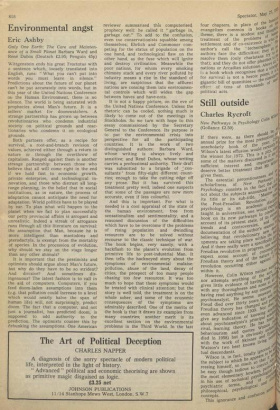Environmental angst
Eric Ashby
Only One Earth; The Care and Maintenance of a Small Planet Barbara Ward and Rene Dubos (Deutsch £2.95; Penguin 45p) Wittgenstein ends his great Tractatus with a sentence which, loosely translated into English, runs: "What you can't put into words you must leave in silence." Predictions about the future of our planet can't be put accurately into words, but in this year of the United Nations Conference on the Human Environment, there is no silence. The world is being saturated with prophecies about Man's future. It is a sellers' market for doomwatchers. A strange partnership has grown up between revolutionaries who condemn industrial society on political grounds and reactionaries who condemn it on ecological grounds. Both partners offer, as a recipe for survival, a root-and-branch revision of values, achieved either through a return to nature or through the overthrow of capitalism. Ranged against them is another strange partnership: between those who believe that all will come right in the end if we hold fast to economic growth, private enterprise, and technological innovation, and those who distrust all longrange planning, in the belief that in social institutions, as in nature, the process of adaptation cannot anticipate the need for adaptation. World politics have to be played by ear. To plan what will happen to the planet when we fail to plan successfully our petty provincial affairs is arrogant and unrealistic. Indeed a streak of arrogance runs through all this literature on survival: the assumption that Man, because he is more intelligent than mastodons and pterodactyls, is exempt from the mortality of species. In the procession of evolution, why should we stay on the stage longer than any other animals? It is important that the pessimists and optimists should argue about Man's future, but why do they have to be so strident? And divisive? And sometimes disingenuous? The latest fashion is to call in the aid, of computers. Computers, if you feed doom-laden assumptions into them (e.g. that pollution could increase to a level which would nearly halve the span of human life) will, not surprisingly, predict doom. The fact that a computer, and not just a journalist, has predicted doom, is supposed to add authority to the prediction, The optimists counter this by debunking the assumptions. One American reviewer summarised this computerised, prophecy well: he called it "garbage in, garbage out." To add to the confusion, even trie conservationists squabble among themselves; Ehrlich and Commoner competing for the status of population on the one hand, and technological flaw on the other hand, as the fuse which will ignite and destroy civilisation. Meanwhile the poor nations, for whom every smoking chimney stack and every river polluted by industry means a rise in the standard of living, are suspicious that the affluent nations are conning them into environmental controls which will widen the gap between haves and have-nots. It is not a happy picture, on the eve of the United Nations Conference. Unless the rhetoric can be cooled, nothing much is likely to come out of the meetings in Stockholm. So we turn with hope to this essay commissioned by the Secretary General to the Conference. Its purpose is to put the environmental crisis into perspective for all the participating countries. It is the work of two distinguished authors; Barbara Ward, whose writing is always lively and sensitive; and Rene Dubos, whose writing carries a professional authority. Their draft was submitted to a brigade of 'consultants' from fifty-eight different countries; enough to take the cutting edge off any prose. But it has survived this treatment pretty well; indeed one suspects that some of the passages are now more accurate, even if less colourful. And this is important. For what is needed, is a cool appraisal of the state of the human environment, free from sensationalism and sentimentality, and a reasoned discussion of the difficulties which have to be overcome if the problems of rising population and dwindling resources are to be solved without recourse to the classic technique of war. The book begins, very sanely, with a backflash to the planet's evolution from primitive life to post-industrial Man. It then tells the hackneyed story about the symptoms of environmental malaise: pollution, abuse of the land, decay of cities, the prospect of too many people chasing too few resources. It was too much to hope that these symptoms would be treated with clinical attention; but the story is well told, the treatment is on the whole sober, and some of the economic consequences of the symptoms are admirably described. One of the merits of the book is that it draws its examples from many countries; another merit is its excellent section on the environmental problems in the Third World. In the last Spectator, May 27' 10 four chapters, in place of the fall3tiliciii51 theme, common in books 011httNi heme, there is a modest and Outgo treatment of the problems of hat settlement settlement and of co-existence in w—trille author's call the technosphere', iø authors face the difficulties; they ° do resolve them (only charlatans try t,°,10 at); and they do not offer placebos wiot .nations or Arcadian solutions. Above„:te kgY 3 a book which recognises that a for s',`iTis a or survival is not a heroic poem 11 tic 0 gigan bill of quantities — the cu 1191'1 effect of tens of thousands °' 5 political acts.










































 Previous page
Previous page